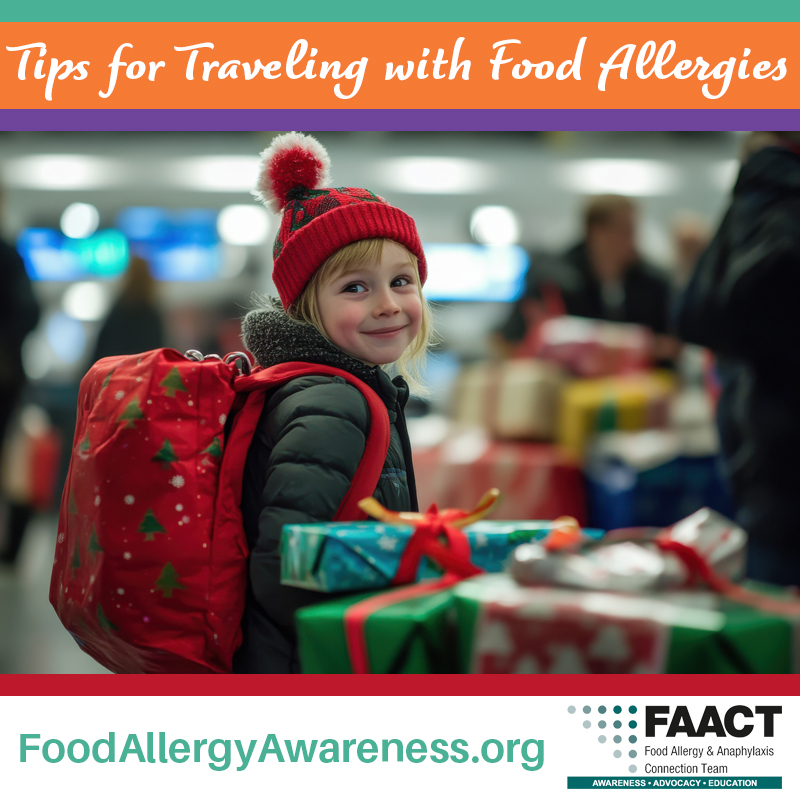Tips for Traveling with Food Allergies

Tips for Traveling with Food Allergies
Are you feeling anxious about traveling with food allergies as the holiday season approaches? As we head into peak travel time, having a plan in place is more important than ever.
Navigating airports, hotels, and unfamiliar restaurants can be challenging due to the lack of control over the environment and the potential for exposure to allergens.
Whether you're flying across the country or taking a road trip to visit loved ones, it’s crucial to prepare so you can feel safe and stress-free throughout your trip.
The good news is that with the right strategies, you can avoid unwanted surprises and keep your allergies in check.
To help you prepare, in this blog, we'll share five essential tips to help you travel with confidence.
5 Essential Strategies for Traveling Safely with Food Allergies
1. Research Allergy-Friendly Destinations
During the holiday season, many of us are traveling to visit family, which often means staying in familiar places—but don’t overlook the importance of researching your destination's food allergy accommodations. Even if you’re heading to an area, you’ve visited before, take time to refresh yourself on the local dining options and their allergy protocols.
Look for restaurants with clear food labeling and menus that cater to dietary restrictions. If you're staying in a new area or with extended family, make sure to research nearby grocery stores and healthcare facilities in case of an emergency.
For more tips on how you can find an allergy-friendly restaurant, click here!
2. Pack Essentials for a Safe Trip
A well-packed travel kit is essential for anyone managing food allergies while on the go. Always bring enough allergy medications, including additional epinephrine devices stored in various locations in case of misplaced devices. Remember to always carry two epinephrine devices with you at all times. If flying, pack additional devices accordingly for longer flights.
For more suggestions on what you should pack, view our comprehensive traveler’s checklist here!
3. How to Navigate Airports and Flights with Food Allergies
Navigating airports and flights with food allergies requires thoughtful preparation.
Follow these key steps to stay safe:
- Notify the airline early: As soon as you book your flight, inform the airline about your allergies.
- Pack your own food: Bringing your own snacks or meals is often safer than relying on in-flight meals. Keep allergy-safe foods in your carry-on to avoid potential cross-contamination in airport terminals or on the plane.
- Wipe down your seating area: Use wipes to clean your seat, belt, armrest, tray table, and any surfaces you may touch. This reduces the risk of exposure to allergens from previous passengers.
- Communicate with flight attendants: Once onboard, remind the flight crew about your allergies. They can take precautions, such as making announcements or ensuring nearby passengers are mindful of potential allergens.
For more information to help you navigate airports and flights, explore here!
4. Choose Allergy-Friendly Accommodations
When it comes to choosing accommodation, prioritize places that offer the flexibility to prepare your own meals. Options like vacation rentals, apartments, or extended-stay hotels with kitchenettes allow you to cook in a controlled environment, reducing the risk of accidental exposure to allergens.
If you’re staying at a hotel, contact them in advance to inquire about their food allergy protocols and whether they can provide allergy-friendly dining options. Some hotels even have partnerships with local restaurants that cater to specific dietary needs.
5. Stay Connected and Have an Emergency Plan
It’s critical to stay connected and have an emergency plan in place while traveling.
Here’s how to prepare:
- Keep your phone charged: Always have your phone fully charged and carry a portable charger to ensure you're never without communication.
- Save emergency contacts: Store local emergency numbers, including contacts for nearby hospitals, urgent care centers, and your personal physician. If traveling internationally, know the local equivalent of 911.
- Inform your travel companions: Make sure your family or travel partners know about your food allergies and how to respond in case of an emergency.
- Teach the use of emergency medications: Show your companions how to use your epinephrine device or any other emergency medications you carry. Having someone who knows how to act quickly in case of an allergic reaction is essential.
- Stay vigilant: Ensure that everyone around you is aware of your allergies and knows how to help if needed. Being prepared can make all the difference in managing unexpected situations.
Travel Confidently with FAACT
As the holiday season approaches, planning ahead for your food allergies can make all the difference in ensuring a safe and enjoyable trip.
By following FAACT’s essential tips—whether it’s researching your destination, packing allergy-friendly essentials, or staying vigilant at airports and restaurants—you can travel confidently knowing you’ve minimized your risks.
With the right preparation and support, your trip can be focused on what really matters: spending quality time with loved ones and making lasting memories.
Do you want to learn more tips to increase your confidence when traveling? Follow us on Facebook, Instagram, Threads, BlueSky, LinkedIn, Pinterest, TikTok, and YouTube!

